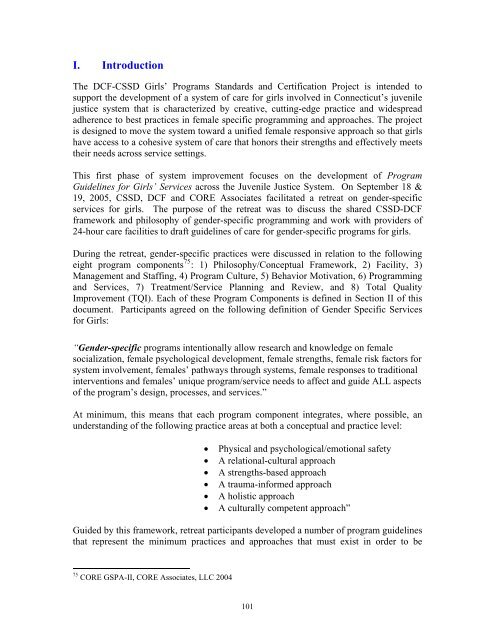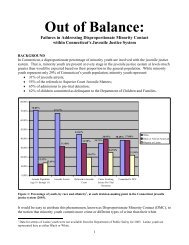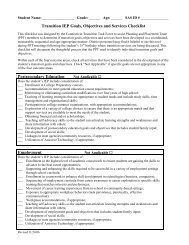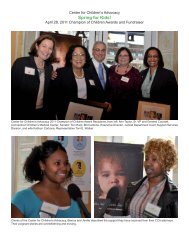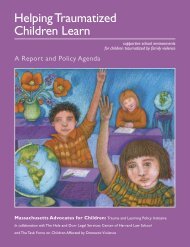FWSN-advisorybd-repo.. - The Connecticut Juvenile Justice Alliance
FWSN-advisorybd-repo.. - The Connecticut Juvenile Justice Alliance
FWSN-advisorybd-repo.. - The Connecticut Juvenile Justice Alliance
You also want an ePaper? Increase the reach of your titles
YUMPU automatically turns print PDFs into web optimized ePapers that Google loves.
I. Introduction<br />
<strong>The</strong> DCF-CSSD Girls’ Programs Standards and Certification Project is intended to<br />
support the development of a system of care for girls involved in <strong>Connecticut</strong>’s juvenile<br />
justice system that is characterized by creative, cutting-edge practice and widespread<br />
adherence to best practices in female specific programming and approaches. <strong>The</strong> project<br />
is designed to move the system toward a unified female responsive approach so that girls<br />
have access to a cohesive system of care that honors their strengths and effectively meets<br />
their needs across service settings.<br />
This first phase of system improvement focuses on the development of Program<br />
Guidelines for Girls’ Services across the <strong>Juvenile</strong> <strong>Justice</strong> System. On September 18 &<br />
19, 2005, CSSD, DCF and CORE Associates facilitated a retreat on gender-specific<br />
services for girls. <strong>The</strong> purpose of the retreat was to discuss the shared CSSD-DCF<br />
framework and philosophy of gender-specific programming and work with providers of<br />
24-hour care facilities to draft guidelines of care for gender-specific programs for girls.<br />
During the retreat, gender-specific practices were discussed in relation to the following<br />
eight program components 75 : 1) Philosophy/Conceptual Framework, 2) Facility, 3)<br />
Management and Staffing, 4) Program Culture, 5) Behavior Motivation, 6) Programming<br />
and Services, 7) Treatment/Service Planning and Review, and 8) Total Quality<br />
Improvement (TQI). Each of these Program Components is defined in Section II of this<br />
document. Participants agreed on the following definition of Gender Specific Services<br />
for Girls:<br />
“Gender-specific programs intentionally allow research and knowledge on female<br />
socialization, female psychological development, female strengths, female risk factors for<br />
system involvement, females’ pathways through systems, female responses to traditional<br />
interventions and females’ unique program/service needs to affect and guide ALL aspects<br />
of the program’s design, processes, and services.”<br />
At minimum, this means that each program component integrates, where possible, an<br />
understanding of the following practice areas at both a conceptual and practice level:<br />
• Physical and psychological/emotional safety<br />
• A relational-cultural approach<br />
• A strengths-based approach<br />
• A trauma-informed approach<br />
• A holistic approach<br />
• A culturally competent approach”<br />
Guided by this framework, retreat participants developed a number of program guidelines<br />
that represent the minimum practices and approaches that must exist in order to be<br />
75 CORE GSPA-II, CORE Associates, LLC 2004<br />
101


